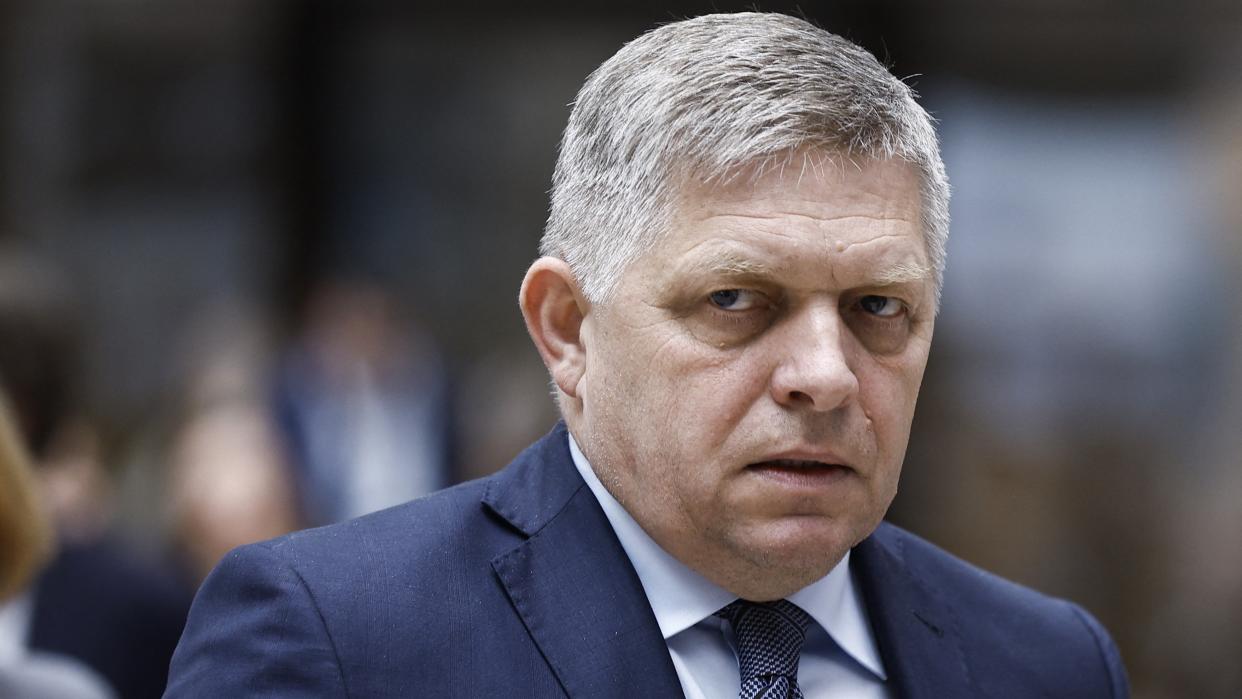Fico assassination attempt exposes deep divisions in Slovakia

- Oops!Something went wrong.Please try again later.
Slovakia's interior minister warned the country could be on the brink of "civil war" after the attempted assassination of Prime Minister Robert Fico laid bare the country's bitter political divides.
The populist leader was shot multiple times and gravely wounded in the town of Handlova on Wednesday, but government officials have said he is expected to survive.
At a press conference outside Banská Bystrica Hospital, where Fico was being treated, Interior Minister Matúš Šutaj-Eštok said there was "a clear political motivation" behind the assassination attempt, and warned that the country was "on the edge of a civil war" due to the rising political tension.
Calling for an end to the violent language and social media attacks that have become a feature of the political landscape under Fico, he said: "I want to appeal to the public, to journalists and to all politicians to stop spreading hatred".
Why is Slovakia so polarised?
Social division was perhaps "always going to bedevil politics in Slovakia" following the 1989 revolutions which spread across Eastern Europe and the breakup of Czechoslovakia, said Politico. The "social whiplash" of these sudden transformations "turned city against village, young against old, Slovak patriot against Czechoslovak internationalist, as all searched for their footing in unfamiliar terrain".
But Wednesday's assassination attempt has put a spotlight on the more recent "collective malfunction" in Slovakia, said The New York Times.
Fico has been a polarising figure in Slovakian politics since the 1990s with his support base made up mainly of older, nationalist voters. Since his re-election in October, the populist leader has pushed through a "strongly contested" overhaul of the judiciary to limit the scope of corruption investigations, has attempted to turn the national broadcaster into state-run TV to "purge what the government calls liberal bias", cracked down on foreign-funded non-governmental organisations, and has strongly opposed military aid to Ukraine, as well as LGBTQ rights. He also "favours friendly relations" with Vladimir Putin, winning comparisons with Hungary's right-wing nationalist leader Viktor Orban.
The decisions taken by Fico's government, as well as its frequently inflammatory rhetoric, have "led to repeated massive protests and petitions by both the opposition and civil society" since December last year, said Euractiv. The main division in Slovakian politics is now between these "more rural, older voters who are more likely to have nationalistic tendencies" and a "liberal, progressive, urban, more Western-focused side", said Tim Haughton, a professor of comparative and European politics at the University of Birmingham, speaking to the i news site.
Who is to blame?
The shooting of Fico is "just the latest manifestation of what happens when politicians adopt populist and hateful rhetoric against their political opponents, the media, the civil society or minorities", said Daniela Richterova, associate professor in intelligence studies at King’s College London.
As political tensions have risen over the last six years, Slovakia has witnessed "unprecedented levels of aggression against politicians and the media", she added, including the 2019 assassination of journalist Ján Kuciak and his fiancée, linked to Kuciak's investigative work exposing high-level corruption in Slovak politics and business.
But aggressive political rhetoric doesn't appear to have abated in the wake of Fico's shooting. Lubos Blaha, the vice chairman of Fico's Smer party, accused the opposition and "liberal media" of having "built a gallows" for the prime minister by "spreading so much hatred". And Fico himself has not shied away from strong words. Before he was shot on Wednesday, Fico denounced an opposition leader as "worse than a rat".
What will happen next?
Officials said this week that Fico's condition had stabilised. But the deputy prime minister said at a news conference that he was "not out of a life-threatening situation" and that Fico had only a “limited” ability to communicate and faced a “difficult” recovery.
If he remains gravely ill, he could be replaced by one of his deputy prime ministers under the Slovak Competence Act.

